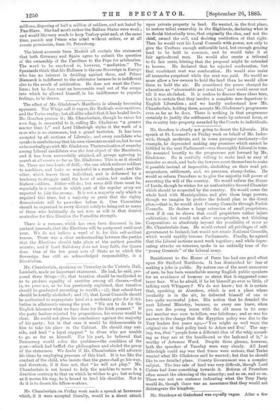Mr. Chamberlain, speaking on Thursday in the Victoria Hall, Lambeth,
made an important statement. He had, he said, pro- posed three things—(l), that taxation should be readjusted so as to produce equality of sacrifice among all classes,—that is, we press [Le, as he has previously explained, that taxation should be graduated according to wealth ;—(2), that school-fees should be totally abolished ; and (3), that Local Councils should be authorised to expropriate land at a moderate price for distri- bution in allotments among the poor. " We are to do for the English labourer what we have done for the Irish peasant." If the party leaders rejected his propositions, his course would be clear. He could not press his conclusions against the majority of his party ; but in that ease it would be dishonourable in him to take his place in the Cabinet. He should stay out- side, and lend " a loyal support " to those who are unable to go as far as himself. For his part, he believed that Democracy would solve the problem—the condition of the poor—which had baffled the philosophers and eluded the grasp of the statesmen. We doubt if Mr. Chamberlain will advance his ideas by employing pressure of this kind. It is too like the conduct of the child, who insists that the game shall go his way, and threatens, if it does not, that "he will not play." Mr. Chamberlain is not bound to help the machine to move in a direction contrary to that on which he wishes to go ; but so long as it moves his way, he is bound to lend his shoulder. Not to do it is to desert his fellow-workers.


































 Previous page
Previous page